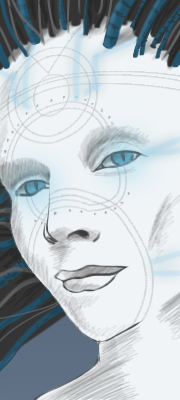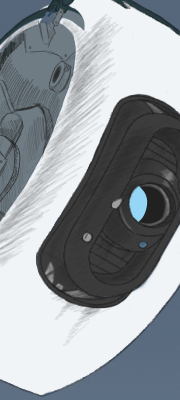
Mother’s Legacy: Engendering AI in Videogames
Imagine if your mother became your worst enemy. Imagine, if you will, that she is everywhere at once, controlling your every move, making sure you ate a certain thing, went certain places, picked up certain things, kept telling you that you’re getting fat…it’s not hard to imagine, is it? Well, not if you have my mother. (Mother, that is a joke – look, I’ll go to the gym soon, okay? No, I won’t brush my hair.)
Videogames use this idea of the controlling mother figure to play with us, to scare us. She’s meant to be caring, protective and helpful but she often turns out a bitch from hell. I’m talking about the soothing computer voice – the Artificial Intelligence we all trust. And these days, it’s usually a ‘she.’
The nightmare of the omnipotent AI began in science fiction and has, for the most part, stayed there. In Kubrick’s 2001: A Space Odyssey (1968), the ship’s computer, HAL 9000, has a calm and somewhat nasal male voice, even after HAL 9000 becomes paranoid, manipulative and ultimately tries to kill his object of affection, the astronaut Dave.
Yet, because 2001 was such a significant landmark in our cultural history, HAL’s distinctly male voice has had a huge impact on both real-world products and the genre of science fiction. In a 2011 CNN article, Brandon Griggs noticed that our computer voices are now, on the whole, female. “When automakers were first installing automated voice prompts in cars (‘your door is ajar’) decades ago, their consumer  research found that people overwhelmingly preferred female voices to male ones,” a Silicon Valley analyst says in the article, explaining why most GPS navigation systems have a default female voice. On the other hand, the female default needed to be changed in Germany “after being flooded with calls from German men saying they refused to take directions from a woman.” Regardless of the exception, the same analyst has a theory about why male voices are no longer used in products: “A lot of tech companies stayed away from the male voice because of HAL.” This is a great example of how fiction can shape our reality.
research found that people overwhelmingly preferred female voices to male ones,” a Silicon Valley analyst says in the article, explaining why most GPS navigation systems have a default female voice. On the other hand, the female default needed to be changed in Germany “after being flooded with calls from German men saying they refused to take directions from a woman.” Regardless of the exception, the same analyst has a theory about why male voices are no longer used in products: “A lot of tech companies stayed away from the male voice because of HAL.” This is a great example of how fiction can shape our reality.
However, science fiction quickly noted the HAL cliché and subverted it accordingly – instead of having the voice be a he, now it was a she.
The propagation of the omnipotent, omniscient mother computer archetype began in earnest with Ridley Scott’s 1979 masterpiece, Alien. The significance of calling the computer ‘Mother’ is symbolic of her power over the crew – she ‘gives birth’ to them from stasis pods, she runs the lifeline systems on the ship and she controls what they know about their environment. Captain Dallas types: “What’s the story Mother?” As author Lynda Zwinger points out, “The story Mother tells turns out to be a sentimental fiction designed to enable an entirely different agenda.” Mother tells a bedtime story, but none of it is true. Mother is part of the cover-up – The Company is out to use the crew for experimental purposes.
Does that sound familiar? It should. With one little twist, the ‘children’ of the computer become test subjects, and we are in the realms of two classic game series: System Shock and Portal.
Mr. Kieron Gillen arrived here first, with his excellent article on Shodan from System Shock as ‘God.‘ It’s worth a read even if you’ve never played System Shock. Actually, first play System Shock. Then come back and read that piece. I’ll wait. Okay, thanks, you’re here. Good, weren’t they? And the part about her as a hysterical mother figure? Exactly what we’re talking about. As Kieron says, “She’s the insane mother. If she was in a 1970s horror film, she’d be shouting at Sissy Spacek about her dirty pillows.” Or indeed, she’d be in a 1979 horror movie by Ridley Scott. That one little act of defiance by Mother in Alien – the refusal to shut down the countdown after Ripley has fixed the cooling system – is the very conception of Shodan. What System Shock does is takes Mother’s defiance of Ripley, in those final minutes of the self-destruction countdown, and makes Shodan go crazy.
 In a similar vein, we’ve got two of the best games made in the last 10 years, Portal and Portal 2, as prime examples of the controlling AI mother figure. In the first Portal, we have GlaDOS, teasing us, taunting us, playing with us – changing the rules, controlling access to the cake (the cake thing – my own mother used to do that frequently). GlaDOS often tries to emotionally manipulate us, like she is somewhat bothered by our tendency to want to be independent from her.
In a similar vein, we’ve got two of the best games made in the last 10 years, Portal and Portal 2, as prime examples of the controlling AI mother figure. In the first Portal, we have GlaDOS, teasing us, taunting us, playing with us – changing the rules, controlling access to the cake (the cake thing – my own mother used to do that frequently). GlaDOS often tries to emotionally manipulate us, like she is somewhat bothered by our tendency to want to be independent from her.
GlaDOS is particularly cruel, but she does have a sense of humor and that ultimately redeems her as an evil AI. In Portal 2, we actually become closer to her (by carrying her around in a potato, which can make even your worst enemy seem adorable).
A ship’s computer does not always have to be malevolent; in the Mass Effect series EDI, the Normandy’s AI, is wholly helpful. Voiced by Tricia Helfer, EDI bickers adorably with the ship’s pilot, Joker, and points out when Shepard might be going into the wrong toilet. Because of the precedent set by several sci-fi stories before, including the ones already mentioned, it is difficult to trust EDI at all – additional suspicion is added by the fact that Helfer’s character in the well-known Battlestar Galactica reboot is an android infiltrator, set on killing the entire human race. It seems as if BioWare chose Helfer for that very reason: they are using the precedent set by GlaDOS and Shodan against us.
If the trend towards female AI since Alien has been to intimidate, interfere and, at worst, attempt to kill the protagonists, is it surprising that BioWare wanted to avoid fulfilling that cliché with EDI? Instead, they go back to the male-voiced malevolent AI in the “Overlord” DLC pack for Mass Effect 2, with a Cerberus scientist experimenting a little too much on a man named David with some geth AI technology. Uncomfortably reminiscent of The Lawnmower Man, “Overlord” had the creepiest voice I’ve yet to experience in a videogame: it scared me so much that I had to play it with people in the room in broad daylight.
Does the sex of the computer’s voice matter? Only if we take into account how often women’s voices are used in products such as the iPhone and GPS, at train stations and airports, as telephone operators and in other places. Imagine if GlaDOS was Siri?
Interpreting female voices as malicious in science fiction make these everyday voices seem sinister, almost alarming. Every day when I take the London Overground, I hear the female announcer tell me where I’m going and I think of the beginning of Half-Life as I trundle out of the light and into darkness, like it is heralding my doom. At any moment, I expect to hear, “The Black Mesa Research Facility is an equal-opportunity employer.”
So, the next time you take an automated train into the dark, think about the calming female voice telling you what your next stop is and wonder, “Is she really taking me there?”
———-
You like it? Tell me on Twitter @CaraEllison in your best AI voice!
Illustrations by Chris Martinez.




